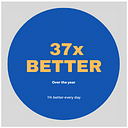The Hidden Hurdle: Why Your Active Fund Might Be Falling Short
Ever feel like you're running a race with weights strapped to your ankles? That's exactly what many active fund managers are doing - and they might be taking your investment returns down with them.
We’ve all heard the buzz about active vs. passive investing. But here’s a plot twist: The real battle isn’t between active and passive funds. It’s between active funds and their hefty price tags.
Why does this matter to you?
• Your returns take a hit: Even if an active fund outperforms the market, those gains can be quickly eroded by fees.
• Compound effect: Over time, these fees can significantly impact your long-term wealth accumulation.
• False sense of security: You might think you’re getting superior performance, when in reality, you’re just paying more for average results
So, what can you do?
1. Look beyond performance: When evaluating funds, pay close attention to the expense ratio.
2. Do the math: Calculate how much you're really paying in fees and compare it to potential returns.
3. Consider low-cost alternatives: Index funds and ETFs often offer similar exposure at a fraction of the cost.
4. Ask tough questions: If you're working with a financial advisor, don't be afraid to question high-fee investments.
5. Rebalance regularly: Review your portfolio to ensure you're not holding onto underperforming, high-cost funds.
Remember, it's not about avoiding active funds altogether. Some truly exceptional managers do exist. But it's crucial to weigh the potential benefits against the very real cost hurdle.
The takeaway?
Next time you're considering an investment, ask yourself: "Am I paying for performance, or am I just paying?"
Your future self (and wallet) will thank you for being fee-conscious today.
